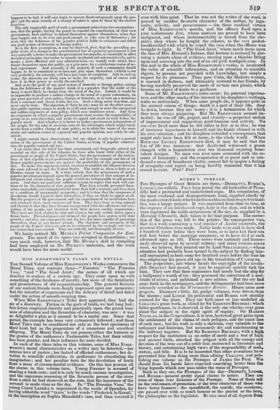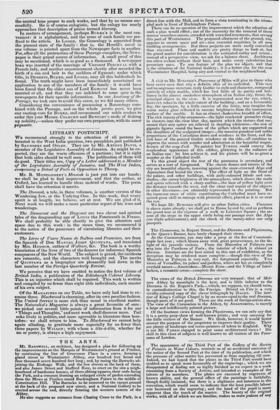BURKE'S PEERAGE.
THE Peerages of Great Britain are three,—DEBRETT'S, BURKE'S, LODGE'S (so called). For a long period the old bookseller of Picea- dilly had a protracted and undisturbed reign. His compilation, of the most confused and disproportionate kind, supplied chiefly by the good-natured lordswho wished to emblazon their resreative &mi- lks, was a happy project. It was reprinted from time to time, at the expense of an interleaved copy, kept in the shop, and in which. were registered the noble occurrences of the day, as supplied by a. Morning Chronicle, duly taken in for that purpose. The correc- tion of the press was left to the printer: the consequence was, that in a work containing a vast number of Arabic numerals, the grossest blunders were made. Noble lords were said to have died. a hundred years before they were born, or to have lost their son and heir before the marriage ceremony, or to have died at such advanced ages. as 203. These errors were variously and humor- ously observed upon by several writers; and many curious errors were, we believe, first pointed out by Lord STRANGFORD,—whose attention had probably been turned to the subject by finding him- self represented as born some few hundred years before the time he was employing his green old age in the translation of CAMOENS.
The proprietors, into whose hands the copyright of the invalu- able DEBRETT had passed, it may be supposed quickly took the hint. They saw that their supineness had nearly lost the ship for a halfpenny's worth of tar : they procured the correction of a mul- titude of errors, and published a new edition. But the cry had gone forth in the newspapers, and the delinquencies had been more solemnly recorded in the Wesinanster Review. .Hence arose new projects. DannEris little, fat,. pudgy volumes, were driven from the throne ; and LODGE (in petticoats) and BURKE now sturdily contend for the place. They are both more or less modelled ort COLLINS S great work, as edited by Sir EGERTON BRIDGES ; which. latter gentleman, be it observed, is the only one who has ever gone • about the subject in the right spirit of inquiry. Sir Mums. NICOLAS, in his Compendium, it is true, bestowed great pains upon, the settlement of the claims of each pedigree, and the exact line • of each race; but his work is only a skeleton, very valuable to the antiquary and historian, but necessarily dry and uninteresting to the ordinary inquirer. But Sir EGERTON BRIDGES, with a high respect for the institution as an order of merit and a test of high and ancient birth, attacked the subject with all the energy and devotion of the true son of a noble line, instructed in literature and history, and entertaining high views of the responsibility of ranks. station, and title. It is to be lamented that other avocations have prevented him from doing more than editing CoLLINS, and pub- lishing one volume on the Peerages of JAMES the First. We should from his hands have expected something better than thia lying legends which now pass under the name of Peerages. Such as they are, the Peerages of the day—Deattarr, LOOM,. and Suess—present pretty equal claims to notice. They are none of them true histories of the Peerage. None of them telt us the real reason of promotion, or the true character of those who have borne honours : the spendthrift, the suicide, the murderer, are passed over with as much honour as the patriot or the hero, the philosopher or the legislator. BURKE most of all departs from
the neutral tone proper to such works, and that by no means suc- cessfully. He is of course eulogistic, but the eulogy too nearly approaches that description of praise termed blarney. In matters of arrangement, perhaps BURKE'S is the most con- venient: it is alphabetical, and the arms of each family are pre- fixed to the article. In LODGE, the Genealogy is separated from the present state of the family : that is, the Herald's novel in one volume is printed apart from the Newspaper facts in another. For, after all the pretensions of these Peerage-compilers, the News- paper is. their grand source of information. A small proof of this may be mentioned, which is as good as a thousand. A newspaper hoax was inserted of the marriage of Viscount PERCE VAL with a French lady, and another announcement shortly after recorded the birth of a son and heir to the earldom of Egmont; under which title, in DEBRETT, BURKE, and LODGE, may all this balderdash be found. The truth might have been immediately ascertained on application to any of the members of the family : it would have been found that the eldest son of Lord EGMONT has never been married at all, and that they are indebted to some quiz in the newspapers for their specific information. In our Anatomy of the Peerage, we took care to avoid this error, as we did many others.
Considering the convenience of possessing a Baronetage com- bined with the Peerage, and on the whole pretio pari, we give our casting-vote for BURKE, and recommend our noble readers to order this year Messrs. COLBURN and BENTLEY'S mode of dishing up nobility,—unless they prefer our own preparation, with its sauce piquante.



























 Previous page
Previous page